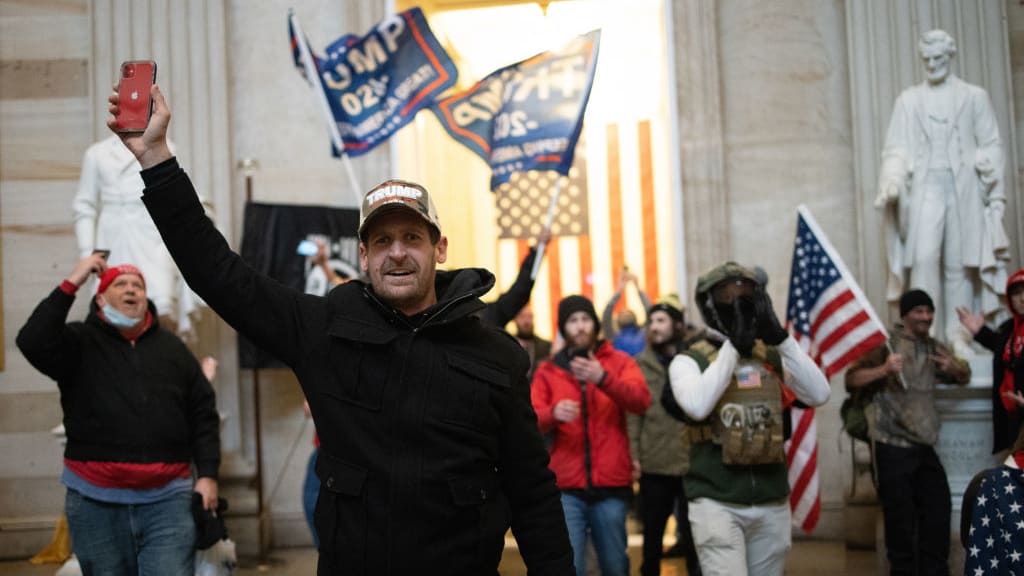Washington Post investigation details red flags federal law enforcement overlooked before Jan. 6


A free daily email with the biggest news stories of the day – and the best features from TheWeek.com
You are now subscribed
Your newsletter sign-up was successful
In the weeks before the Jan. 6 Capitol attack, tips were coming into the FBI and Department of Homeland Security about explicit threats of violence made by people who said they planned on going to Washington, D.C., when Congress was certifying President Biden's victory, but top federal law enforcement officials didn't appear to understand the gravity of what was taking place, The Washington Post reports.
On Sunday, the Post published an investigation into the events of Jan. 6, after speaking with more than 230 people and going through thousands of internal law enforcement reports and memos, court documents, videos, images, and audio recordings. Tips came in from across the U.S. about people vowing online to go to D.C. to fight for former President Donald Trump.
The country's regional homeland security offices — known as fusion centers — were getting reports from social media companies about users who wrote of disrupting Congress on Jan. 6 and hurting lawmakers, the Post reports. The leaders of the fusion centers shared tips on a call a few days before Jan. 6, and afterward the head of D.C.'s fusion center became so concerned, he asked the city's health department to call local hospitals and tell them to prepare for a mass casualty event.
The Week
Escape your echo chamber. Get the facts behind the news, plus analysis from multiple perspectives.

Sign up for The Week's Free Newsletters
From our morning news briefing to a weekly Good News Newsletter, get the best of The Week delivered directly to your inbox.
From our morning news briefing to a weekly Good News Newsletter, get the best of The Week delivered directly to your inbox.
On Dec. 20, one tipster called the FBI and said some Trump supporters, under the impression they had "orders from the president," were discussing ways to sneak guns into D.C., where they intended to "overrun" police and arrest members of Congress, the Post reports. One dismissed threat specifically mentioned Sen. Mitt Romney (R-Utah), the Post reports.
In late December, the FBI received three screenshots of a Parler user threatening to kill politicians and stating, "Don't be surprised if we take the #capital building." The FBI mostly considered such posts to be "largely aspirational" and protected under the First Amendment, senior FBI officials told the Post.
One informant voluntarily sent screenshots to the FBI, saying Three Percenters militia members "literally" took a Dec. 19 Trump tweet about the "big protest" on Jan. 6 — "be there, will be wild" — and a "Fight for Trump" video he later posted as "a call to arms," the Post reports.
Several of the agencies contacted by the Post for comment said they are complying with investigations and learning from what happened to prevent future acts of violence. Trump spokesman Taylor Budowich told the Post its investigation was "fake news" and claimed the people who stormed the Capitol were "agitators not associated with" Trump.
A free daily email with the biggest news stories of the day – and the best features from TheWeek.com
Catherine Garcia has worked as a senior writer at The Week since 2014. Her writing and reporting have appeared in Entertainment Weekly, The New York Times, Wirecutter, NBC News and "The Book of Jezebel," among others. She's a graduate of the University of Redlands and the Columbia University Graduate School of Journalism.
-
 The Olympic timekeepers keeping the Games on track
The Olympic timekeepers keeping the Games on trackUnder the Radar Swiss watchmaking giant Omega has been at the finish line of every Olympic Games for nearly 100 years
-
 Will increasing tensions with Iran boil over into war?
Will increasing tensions with Iran boil over into war?Today’s Big Question President Donald Trump has recently been threatening the country
-
 Corruption: The spy sheikh and the president
Corruption: The spy sheikh and the presidentFeature Trump is at the center of another scandal
-
 Will increasing tensions with Iran boil over into war?
Will increasing tensions with Iran boil over into war?Today’s Big Question President Donald Trump has recently been threatening the country
-
 Corruption: The spy sheikh and the president
Corruption: The spy sheikh and the presidentFeature Trump is at the center of another scandal
-
 Rubio boosts Orbán ahead of Hungary election
Rubio boosts Orbán ahead of Hungary electionSpeed Read Far-right nationalist Prime Minister Viktor Orbán is facing a tough re-election fight after many years in power
-
 Key Bangladesh election returns old guard to power
Key Bangladesh election returns old guard to powerSpeed Read The Bangladesh Nationalist Party claimed a decisive victory
-
 Greenland’s capital becomes ground zero for the country’s diplomatic straits
Greenland’s capital becomes ground zero for the country’s diplomatic straitsIN THE SPOTLIGHT A flurry of new consular activity in Nuuk shows how important Greenland has become to Europeans’ anxiety about American imperialism
-
 Epstein files topple law CEO, roil UK government
Epstein files topple law CEO, roil UK governmentSpeed Read Peter Mandelson, Britain’s former ambassador to the US, is caught up in the scandal
-
 Iran and US prepare to meet after skirmishes
Iran and US prepare to meet after skirmishesSpeed Read The incident comes amid heightened tensions in the Middle East
-
 Which way will Trump go on Iran?
Which way will Trump go on Iran?Today’s Big Question Diplomatic talks set to be held in Turkey on Friday, but failure to reach an agreement could have ‘terrible’ global ramifications
